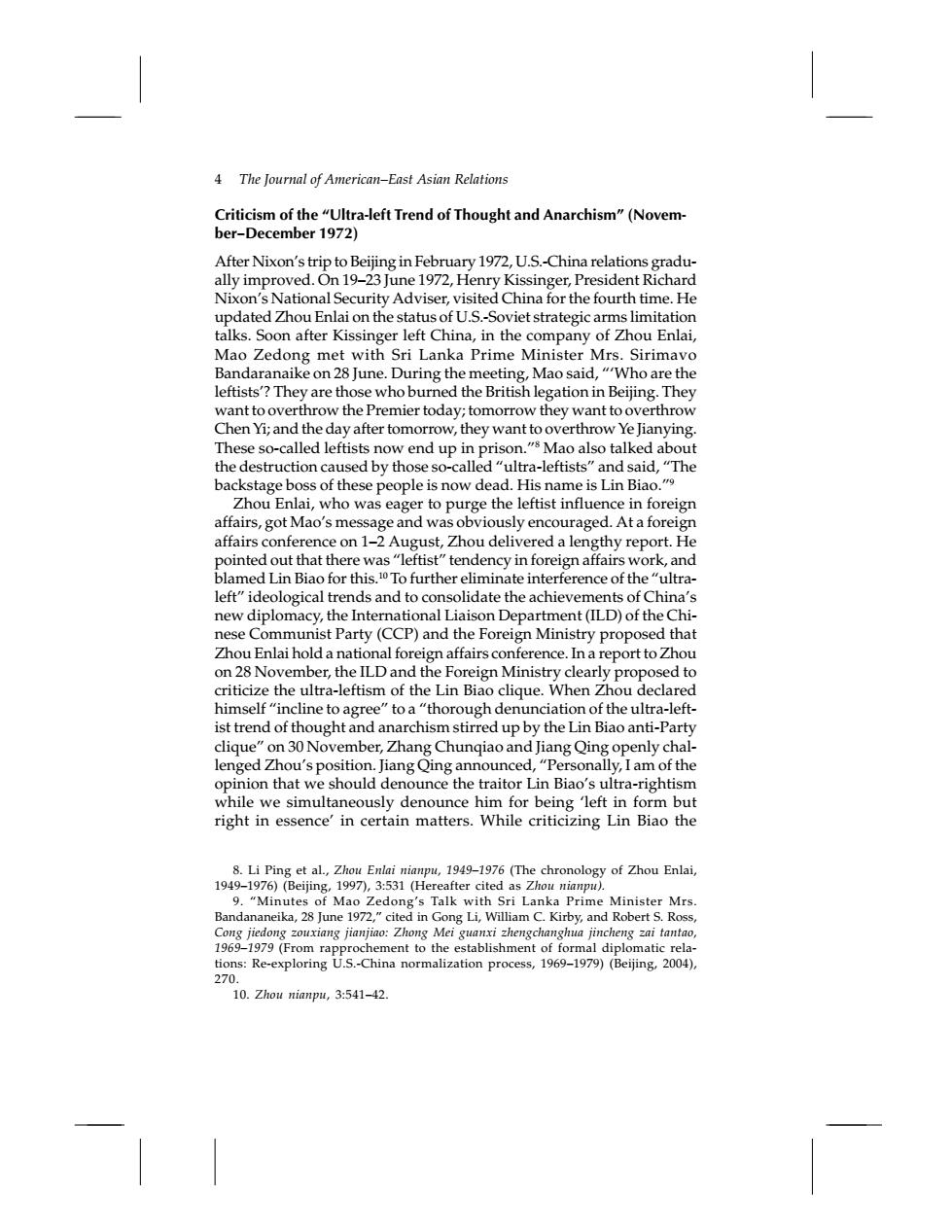正在加载图片...

4 The Journal of American-East Asian Relations Criticism of the "Ultra-left Trend of Thought and Anarchism"(Novem- ber-December 1972) After Nixon's trip to Beijing in February 1972,U.S.-China relations gradu- ally improved.On 19-23 June 1972,Henry Kissinger,President Richard Nixon's National Security Adviser,visited China for the fourth time.He updated Zhou Enlai on the status of U.S.-Soviet strategic arms limitation talks.Soon after Kissinger left China,in the company of Zhou Enlai, Mao Zedong met with Sri Lanka Prime Minister Mrs.Sirimavo Bandaranaike on 28 June.During the meeting,Mao said,"Who are the leftists'?They are those who burned the British legation in Beijing.They want to overthrow the Premier today;tomorrow they want to overthrow Chen Yi;and the day after tomorrow,they want to overthrow Ye Jianying. These so-called leftists now end up in prison.Mao also talked about the destruction caused by those so-called "ultra-leftists"and said,"The backstage boss of these people is now dead.His name is Lin Biao."9 Zhou Enlai,who was eager to purge the leftist influence in foreign affairs,got Mao's message and was obviously encouraged.At a foreign affairs conference on 1-2 August,Zhou delivered a lengthy report.He pointed out that there was"leftist"tendency in foreign affairs work,and blamed Lin Biao for this.0 To further eliminate interference of the"ultra- left"ideological trends and to consolidate the achievements of China's new diplomacy,the International Liaison Department(ILD)of the Chi- nese Communist Party(CCP)and the Foreign Ministry proposed that Zhou Enlai hold a national foreign affairs conference.In a report to Zhou on 28 November,the ILD and the Foreign Ministry clearly proposed to criticize the ultra-leftism of the Lin Biao clique.When Zhou declared himself "incline to agree"to a "thorough denunciation of the ultra-left- ist trend of thought and anarchism stirred up by the Lin Biao anti-Party clique"on 30 November,Zhang Chungiao and Jiang Qing openly chal- lenged Zhou's position.Jiang Qing announced,"Personally,I am of the opinion that we should denounce the traitor Lin Biao's ultra-rightism while we simultaneously denounce him for being 'left in form but right in essence'in certain matters.While criticizing Lin Biao the 8.Li Ping et al.,Zhou Enlai nianpu,1949-1976 (The chronology of Zhou Enlai, 1949-1976)(Beijing,1997),3:531 (Hereafter cited as Zhou nianpu). 9."Minutes of Mao Zedong's Talk with Sri Lanka Prime Minister Mrs. Bandananeika,28 June 1972,"cited in Gong Li,William C.Kirby,and Robert S.Ross, Cong jiedong zouxiang jianjiao:Zhong Mei guanxi zhengchanghua jincheng zai tantao, 1969-1979(From rapprochement to the establishment of formal diplomatic rela- tions:Re-exploring U.S.-China normalization process,1969-1979)(Beijing,2004), 270. 10.Zhou nianpu,3:541-424 The Journal of American–East Asian Relations Criticism of the “Ultra-left Trend of Thought and Anarchism” (November–December 1972) After Nixon’s trip to Beijing in February 1972, U.S.-China relations gradually improved. On 19–23 June 1972, Henry Kissinger, President Richard Nixon’s National Security Adviser, visited China for the fourth time. He updated Zhou Enlai on the status of U.S.-Soviet strategic arms limitation talks. Soon after Kissinger left China, in the company of Zhou Enlai, Mao Zedong met with Sri Lanka Prime Minister Mrs. Sirimavo Bandaranaike on 28 June. During the meeting, Mao said, “‘Who are the leftists’? They are those who burned the British legation in Beijing. They want to overthrow the Premier today; tomorrow they want to overthrow Chen Yi; and the day after tomorrow, they want to overthrow Ye Jianying. These so-called leftists now end up in prison.”8 Mao also talked about the destruction caused by those so-called “ultra-leftists” and said, “The backstage boss of these people is now dead. His name is Lin Biao.”9 Zhou Enlai, who was eager to purge the leftist influence in foreign affairs, got Mao’s message and was obviously encouraged. At a foreign affairs conference on 1–2 August, Zhou delivered a lengthy report. He pointed out that there was “leftist” tendency in foreign affairs work, and blamed Lin Biao for this.10 To further eliminate interference of the “ultraleft” ideological trends and to consolidate the achievements of China’s new diplomacy, the International Liaison Department (ILD) of the Chinese Communist Party (CCP) and the Foreign Ministry proposed that Zhou Enlai hold a national foreign affairs conference. In a report to Zhou on 28 November, the ILD and the Foreign Ministry clearly proposed to criticize the ultra-leftism of the Lin Biao clique. When Zhou declared himself “incline to agree” to a “thorough denunciation of the ultra-leftist trend of thought and anarchism stirred up by the Lin Biao anti-Party clique” on 30 November, Zhang Chunqiao and Jiang Qing openly challenged Zhou’s position. Jiang Qing announced, “Personally, I am of the opinion that we should denounce the traitor Lin Biao’s ultra-rightism while we simultaneously denounce him for being ‘left in form but right in essence’ in certain matters. While criticizing Lin Biao the 8. Li Ping et al., Zhou Enlai nianpu, 1949–1976 (The chronology of Zhou Enlai, 1949–1976) (Beijing, 1997), 3:531 (Hereafter cited as Zhou nianpu). 9. “Minutes of Mao Zedong’s Talk with Sri Lanka Prime Minister Mrs. Bandananeika, 28 June 1972,” cited in Gong Li, William C. Kirby, and Robert S. Ross, Cong jiedong zouxiang jianjiao: Zhong Mei guanxi zhengchanghua jincheng zai tantao, 1969–1979 (From rapprochement to the establishment of formal diplomatic relations: Re-exploring U.S.-China normalization process, 1969–1979) (Beijing, 2004), 270. 10. Zhou nianpu, 3:541–42